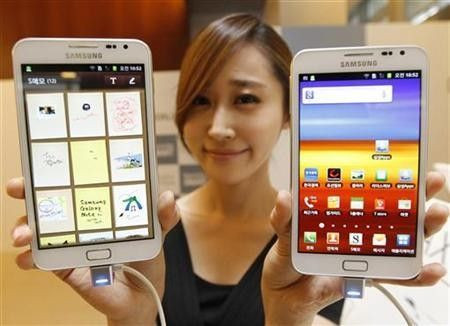Samsung Reports Record Quarterly Profit; Smartphone Gains

Samsung Electronics (005930.KS), the world's top maker of memory chips and smartphones, reported a record quarterly profit on Friday, aided by one-off gains and best-ever sales of high-end phones.
The South Korean firm, which surged past Apple (AAPL.O) as the world's top smartphone maker in the third quarter, is quickly building on its supremacy with sleek designs and a rich product line-up, while the latest models from the likes of HTC (2498.TW), Nokia (NOK1V.HE) and BlackBerry maker Research in Motion (RIM.TO) struggle to interest consumers.
Samsung is also weathering a squeeze on its bread-and-butter memory chip business with new revenue sources such as mobile processing chips and high-end OLED displays. Key rivals are increasingly turning to Samsung for components to power their tablets and smartphones.
The South Korean firm posted on Friday 5.2 trillion won in quarterly operating profit, beating a consensus forecast of 4.7 trillion won by analysts surveyed by Thomson Reuters I/B/E/S. It said actual profit may rise or fall by 200 billion won from the preliminary figure when the firm provides detailed earnings later this month.
The result would top Samsung's previous record profit of 5.0 trillion won earned in the second quarter of 2010 and is up 22 percent from the preceding quarter.
One-off gains expected in the fourth quarter include around 500 billion won from the sale of its hard disk drive business to Seagate Technology (STX.O), and reduced mobile provisions involving royalty payments, according to analysts.
Samsung has traditionally seen its first-quarter profit drop from the fourth quarter, but profit will hold up well, reaching between 4.5 trillion won and 5.0 trillion won, with smartphone sales expected to rise further, said Song Jong-ho, an analyst at Daewoo Securities.
Samsung only entered the smartphone market in earnest in 2010, but its handset division is now its biggest earnings generator.
Sales have skyrocketed thanks to a slick production system that rapidly brings new products to market and has mitigated weakness in its component business of mainly memory chips and flat screens.
SMARTPHONE GAINS
Samsung shares eased on Friday, falling 1.8 percent by 0310 GMT, after charging to a record 1.11 million won earlier this week in anticipation of an upbeat forecast. The company is Asia's most valuable technology firm with a market value of around $150 billion .
Smartphone shipments are forecast at a record 35 million in the fourth quarter, up one quarter from the preceding three months, when it first surged past Apple as the world's top smartphone vendor.
In 2012 it is expected to sell as many as 170 million smartphones, according to BNP Paribas and Korea Investment & Securities, the most bullish street view, from an estimated 95 million last year, powered by a diverse product portfolio that spans high-end Galaxy models to cheap phones using Samsung's own bada software.
Its latest Galaxy Note model, which runs on fast fourth-generation (4G) networks, is touted by some followers as a phablet as its 5.3-inch display and powerful dual-core processor makes it work as both a tablet computer and smartphone. Its successful debut in some European and Asian markets during the year-end holiday season has raised hopes for a solid U.S. launch in coming months.
As expectations for Apple to continue its innovation trail is receding a bit, this will be the year when Samsung solidifies its commanding lead in the smartphone market, said Kim Yun-sang, a fund manager at IBK Asset Management, which owns Samsung stock.
Samsung, the world's biggest technology firm by revenue, estimated fourth-quarter sales at 47 trillion won.
Major headwinds for Samsung in 2012 include slowing growth in global PC sales, which will dent sales of its core computer memory chips.
Weak computer memory chip prices will continue to squeeze earnings at least until the first half of this year. Prices of PC DRAM (dynamic random access memory) chips dropped about 30 percent in the fourth quarter alone, near to production costs.
Samsung remains the sole profitable DRAM chipmaker and is likely to fare better than rivals, helped by heavy investments to cut production costs with finer processing technology.
Its foray into the booming tablet market has been also hit by a global patent battle with Apple, which is seeking to ban sales of Samsung's tablets in major markets.
© Copyright Thomson Reuters 2024. All rights reserved.





















